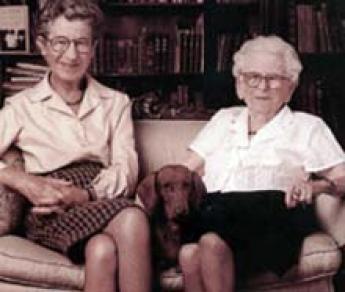Leona Rostenberg

An Obituary
Leona Rostenberg, who died Thursday at age 96, was one of New York’s outstanding rare book dealers, and half of a remarkable team of literary sleuths who discovered the secret “blood-and-thunder” writings of Louisa May Alcott.
It was while following up on longheld literary world suspicions in 1942 that Rostenberg came across a trove of Alcott’s papers that included letters from a Boston publisher confirming that the author of “Little Women” had written racier stuff earlier on in her career. They were “gaudy sensation narratives of hashish experimentation and opium addiction, revenge and murder, especially sexual struggle and feminist manipulation and triumph” Rostenberg wrote.
Together with her literary, business, and life partner Madeleine Stern, Rostenberg publicized the discovery, although the academic world somehow didn’t catch on until the 1970s, when they published several collections of the stories, which originally appeared in such magazines as The Flag of Our Union, the Saturday Evening Gazette, and Frank Leslie’s Illustrated Newspaper. Ms. Stern wrote what is still among the standard biographies of Alcott, in 1950, “Louisa May Alcott: A Biography.”
A leading scholar of the history of publishing, Rostenberg wrote several books about politics and the rise of early printing, as well as volumes of memoirs about her decades in the rare book business. The last of these, “Bookends: Two Women, One Enduring Friendship,” written with Ms. Stern, was published in 2001.
Rostenberg and Ms. Stern’s partnership dated from the early 1930s, when both were college undergraduates in Manhattan. They met while teaching Sabbath school at Temple Emanu-El. The two young women shared a dedication to historical scholarship, and in later years would call each other “Watson and Holmes,” and were photographed in deerstalkers, wielding magnifying glasses.
After graduate studies at Columbia, her dissertation on the politics of 17th century printers was rejected, a decision the university reversed decades later. Rostenberg took a job with the Austrian book dealer Herbert Reichner.Working for the mercurial Reichner, who sometimes called her “Fraulein Dummkopf,”was trying, but Rostenberg came away after five years with a solid grounding in the antiquarian book business. In 1944, backed by Ms. Stern, she opened her own business, stocked with a small collection of volumes written by Renaissance and French philosophers. It seemed like a bold move. “My darling, no woman in our family has ever engaged in commerce,” Rostenberg’s mother told her. The mold was broken.
A year later, Ms. Stern left a tenured teaching position to join her, and the pair traveled to Europe to buy books in the wake of World War II. Over the next few years they established firm relations with antiquarian book dealers in France, England, the Low Countries, and Italy.Among many other treasures, the firm focused on French feminist tracts of the 18th century, volumes produced by the Aldine Press in Venice, and Pilgrim Press books, published by the prototypical dissenters about to leave England for the New World.
In America, Leona Rostenberg Rare Books sold to wealthy collectors,as well as to university libraries around the country.The head of special collections at the Brigham Young University library, Scott Duvall, said Rostenberg was responsible for several of the library’s outstanding collections, including a collection of 2,300 pamphlets from the French Revolution.
In 1960,Rostenberg and Ms.Stern established the Antiquarian Book Fair in New York. Rostenberg later served as president of the Antiquarian Booksellers’ Association of America. In 1973, Columbia University belatedly granted Rostenberg a Ph.D. in history based on her scholarly publications, including “English Publishers in the Graphic Arts, 1599–1700” and “The Minority Press & the English Crown” (1971). She later published a book based on her unusual hobby, “Bibliately” (1978), about her collection of book-themed stamps. She and Ms. Stern maintained a close relationship with the Orchard House museum, Louisa May Alcott’s home, where Ms. Stern sometimes served as an impromptu tour guide.
Rostenberg and Ms. Stern lived in domestic tranquility, at first in the Bronx and later on the Upper East Side, with a succession of dachshunds. In recent decades, as several volumes of co-written memoirs appeared, they granted interviews in which they marinated in their long, productive careers.
Inevitably, interviews would come around to the phrase Finger-spitzengefühl, an instinctual ability to sense the worth of a book through its feel, or more elaborately, they wrote, “a tingling of the finger tips [that] becomes an electrical current of suspense, excitement, recognition ... it is an experience that makes the rare book business a hymn to joy.”
Leona Rostenberg, born December 28, 1908, in New York; died March 17 at her home in Manhattan; survived by her companion, Madeleine Stern.
Published in The New York Sun, March 23, 2005.
"Old Books, Rare Friends. Two Literary Sleuths and Their Shared Passion" - The memoirs of Madeleine Stern and Leona Rostenberg have been published in 1997 (New York, Doubleday)
